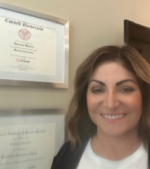Beth McKinney is a lecturer in the College of Human Ecology and former Director of the Cornell University Wellness Program. She received her Bachelor’s degree in Nutritional Sciences and her Master’s degree in Health Education. Ms. McKinney’s expertise in coaching and counseling spans over 20 years and includes life coaching, nutrition counseling, wellness counseling, and behavior change. She also teaches counseling skills and behavior change techniques to Cornell undergraduates. A Certified Health Education Specialist (CHES) and Certified Intrinsic Coach® with previous experience in both clinical and community nutrition, Ms. McKinney specializes in both nutrition education and behavior change.
Overview and Courses
Whether you’re an educator, coach, or wellness professional, this certificate program provides proven counseling techniques to blend within your chosen helping profession. You can significantly enhance your effectiveness, along with the success of the groups you serve, by using specific communication tactics that encourage open and productive partnerships. Additionally, in this program, you will also develop actionable steps to elicit behavior change from your clients and create a culture of wellness within your organization. Throughout the courses, you will have a chance to review and analyze best practices for your field, engage in live, active interviews and exercises with a peer in your class and “clients” from your network, and learn how to combine different counseling techniques for the best results. You will come away more confident, more effective, and ready to lead in your field.
The courses in this certificate program are required to be completed in the order that they appear.
Course list
In this course, you will practice techniques to elicit information from clients, uncover their deeper needs and in turn help them set better goals. You will conduct a session with a colleague, or friend to practice your client-directed counseling skills in a real-life setting, gather feedback from your partner, and then reflect on what you did well and what you would change. You will describe how the use (or lack) of continuing responses in a conversation you've had in the past has affected trust within that conversation, and you will make a plan to better integrate continuing responses into future conversations. You will observe and evaluate another counselor's use of client-centered techniques to elicit information. While identifying and overcoming challenges in implementing client-centered counseling techniques, you will create an action plan to help clients set goals that align with their true needs. At the end of this course, you will be poised to apply new techniques to better identify the client's “need behind the need.”
You are required to have completed the following course or have equivalent experience before taking this course:
- Understanding the Person
In this course, you will use a variety of tools and techniques to help clients set achievable goals and stay motivated. You will identify the top techniques and tips that are specifically applicable to your style of counseling or that can best help you grow as a communicator in your field, and use them to compile a resource for future practice. You will practice applying empathy in order to find out what truly matters to your clients and apply that valuable information to goal setting. You will conduct a motivational interviewing session with a colleague, or friend to practice your skills in a real-life setting, reflect on what you did well and what you would change, and receive helpful feedback from the course facilitator. Finally, you will use five best practices to create your own script for a conversation in which you help a client set a realistic and actionable goal.
You are required to have completed the following courses or have equivalent experience before taking this course:
- Understanding the Person
- Understanding the Deeper Need
Client-directed counseling is effective for one-on-one interactions, working with groups, and working with organizations. This course allows you to further develop your counseling skills, explore wellness for groups and organizations, and solidify a plan for your future. You will create a plan to expand your wellness counseling skills and integrate them with your current area of expertise. You will then expand your counseling skills to support group facilitation. You will practice these skills by engaging with a colleague, or friend outside of the course. Finally, you will create a wellness vision and plan how you will communicate your vision to organizations and employees. By the end of this course, you will be prepared to use your counseling skills to work within organizations focused on improving the health and wellness of their employees.
You are required to have completed the following courses or have equivalent experience before taking this course:
- Understanding the Person
- Understanding the Deeper Need
- Eliciting New Behaviors
How It Works
- View slide #1
- View slide #2
- View slide #3
- View slide #4
- View slide #5
- View slide #6
- View slide #7
- View slide #8
- View slide #9
Faculty Author
Download a Brochure
Not ready to enroll but want to learn more? Download the certificate brochure to review program details.
What You'll Earn
- Wellness Counseling Certificate from Cornell College of Human Ecology
- 40 Professional Development Hours (4 CEUs)
Watch the Video
Who Should Enroll
- Healthcare professionals
- Medical professionals, including doctors, nurses, and aides
- Physical therapists
- Chiropractors
- Wellness coaches
- Personal trainers
- Naturopaths
- Health educators and coaches
- Nutritionists
- Corporate wellness and HR professionals

“As a former Senior C-Suite Fashion Executive and now a Wellness and Nutrition Counselor, I completed the Wellness Counseling certification at Cornell University online so my company, Backes Wellness, can better support clients in reversing a lifetime of poor eating and fitness habits.”
Request Information Now by completing the form below.

Wellness Counseling
| Select Payment Method | Cost |
|---|---|
| $3,900 | |


